
views
Take some deep breaths.
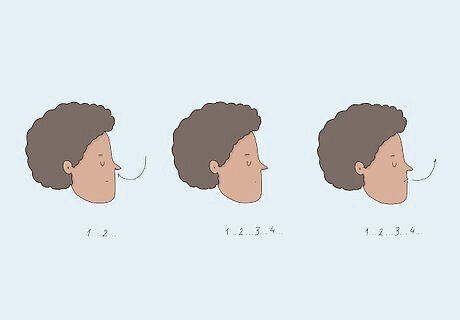
When you feel strong emotions coming on, pause for a moment. Breathe deeply in through your nose, then let it out through your mouth. Try doing this 5 to 10 times until you feel your heart rate slowing and you can control your breathing. This is also a good way to control anxiety. Deep breathing is a good way to control your emotions subtly. For instance, let’s say you run into an ex—you might not have time to step away and control your emotions on your own. You can secretly practice deep breathing even while in a conversation with someone.
Focus on your body, not your mind.

Get up and walk around or do some stretching. What does your body feel like right now? Pay attention to the feeling of the clothes on your skin, and try to ignore any thoughts that you’re having. This can help you stay grounded and control emotional outbursts in the moment. Taking a nature walk is also a good way to ground yourself. You could also massage your own shoulders and focus on the sensation of touch. Or, if you have time, do a few yoga poses as a way to connect with your body.
Look at yourself in the mirror.

It will help you reconnect with your body and your mind. If you feel yourself starting to get upset or angry, head to the bathroom and look at the mirror for a few minutes. As you do, focus on taking deep breaths and think about increasing your self-compassion. After 2 to 3 minutes, you’ll probably feel your heart rate slow down and your breathing get a little more even. Heading to the bathroom also lets you take a little break to control your emotions by yourself. It’s a good tool to use at work or out in public when things get a little overwhelming.
Repeat a mantra to yourself.
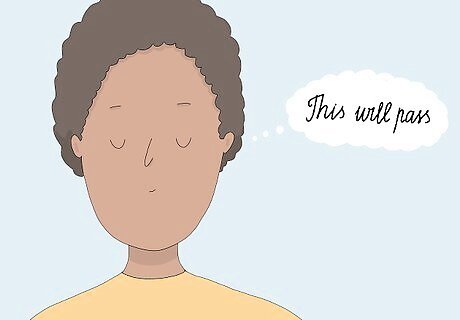
A simple phrase can help you calm your emotions. When you feel yourself getting worked up, take some deep breaths and repeat your mantra inside your mind. You can pick whatever phrase you’d like, but some common ones include: “This isn’t about me.” “No need to get worked up.” “This will pass.”
Distract yourself.

Do something engaging that will keep your mind off your emotions. Try to pick something that really works your brain: do a puzzle, read a new book, try a word search, or do some art. The more you can keep your mind off things, the less you’ll focus on your emotions. Stay away from mindless activities, like watching TV or scrolling through social media. These aren’t very engaging, so they won’t do much to distract you.
Avoid emotional triggers.
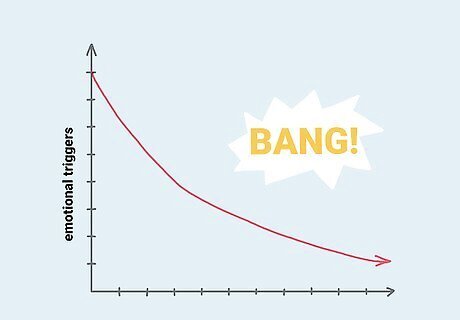
Some things rile us up no matter what we do. If you know that you get stressed or angry when you’re running late, plan on leaving the house 10 minutes early. If there’s an acquaintance you find particularly annoying, avoid the spots they’re most likely to hang out. While you can’t avoid your emotional triggers all of the time, you can do your best to limit them in your day-to-day life.
Challenge your negative thoughts.

Negative thoughts can really skew our perceptions. You can ask yourself things like “Is that really true?” or, “What evidence do I have to support that?” to think logically instead of with your emotions. Over time, you may be able to stop your negative thoughts in their tracks. For instance, if you catch yourself thinking, “I don’t have any friends,” ask yourself, “Is that really true? Didn’t I just hang out with my friends over the weekend?” Or, if you catch yourself thinking, “I’m gonna do so bad on this project,” ask yourself, “What evidence do I have to support that? I can’t see into the future.”
Change your perspective on emotions.

Often, we think of our emotions as negatives. Instead, try to see them as a helpful tool. If you’re super nervous before a job interview and you find yourself shaking or sweating, reframe the emotion by saying, “Wow, I have so much energy for this interview!” Your emotions now become a silver lining instead of a hindrance. If you find yourself getting angry or frustrated with a coworker, remind yourself that you’re just passionate about your work and you want to do a good job. If you feel yourself getting sad because you have to see your ex, tell yourself that your sadness just means you’re going to have a lot of love to give to your next partner.
Worry about your own problems.

Shouldering the burdens of others can really wear you down. If you’re an empathetic person, listening to your friends or family members vent about their issues can really take a toll on you. It’s great to care about other people, but it’s also okay to set boundaries if you need to take some time for yourself. For instance, if your friend wants to call and chat about her terrible boyfriend, you could say, “I love talking to you, but I’m just not in the headspace to offer advice right now. Could we talk next week instead?” You could also say, “In the future, would you mind asking before you call to vent? I love chatting with you, but sometimes I’m just in a terrible mood and I can’t offer good advice.”
Practice mindfulness.
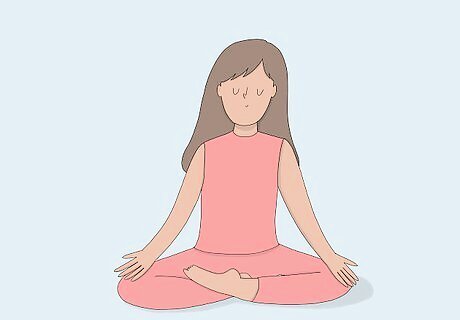
Mindfulness can help you control emotional outbursts. Instead of focusing on what might happen in the future, pay attention to what’s going on right now in this moment. It might help to focus on your senses: name a few things you can see, smell, taste, feel, and hear to stay present. Mindfulness is also great for your mental health in general, especially if you deal with anxiety.
Put yourself first.

Don’t allow the emotions of others to take over your life. Instead, focus on yourself and your goals for the future. It can be difficult at first, but prioritizing yourself over others will leave you feeling happier and healthier in the long run. This can be as simple as declining someone’s request for a favor because you’re just too busy. Prioritize your own stress levels to put yourself first.
Keep a journal.

Work through your emotions in a healthy way. Set aside 5 to 10 minutes every night to write about what you did that day and how you felt. If you experienced any strong emotions, write about what happened and how you handled it. Letting your feelings out will keep you from bottling them up so you don’t explode. Keep your journal in a private place so no one else can read it.
Get enough sleep.

Studies show that lack of sleep can lead to emotional outbursts. Make sure you’re getting at least 8 hours of sleep every night so you wake up rested and ready to tackle the day. Sleep is a very important part of mental health, and getting enough will benefit every aspect of your life. When you’re well rested, you’re more capable of making calm, rational decisions instead of basing them on emotions.
Avoid using drugs or alcohol to bury your emotions.

It will probably only make your problems worse. Using drugs or alcohol to tamp down what you’re feeling isn’t a good long-term solution, and your emotions will continue to build until you address them. Self-medicating is never a good idea, and it can leave you in a worse place than when you started. Food can also be used as a way to tamp down emotions, whether that’s overeating or undereating. Try to stick to a regular diet as you work through your emotions.
















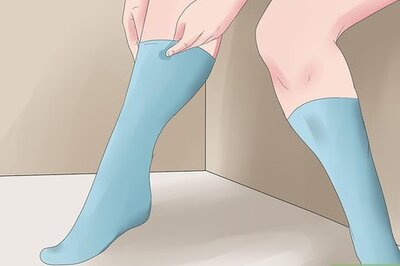
Comments
0 comment